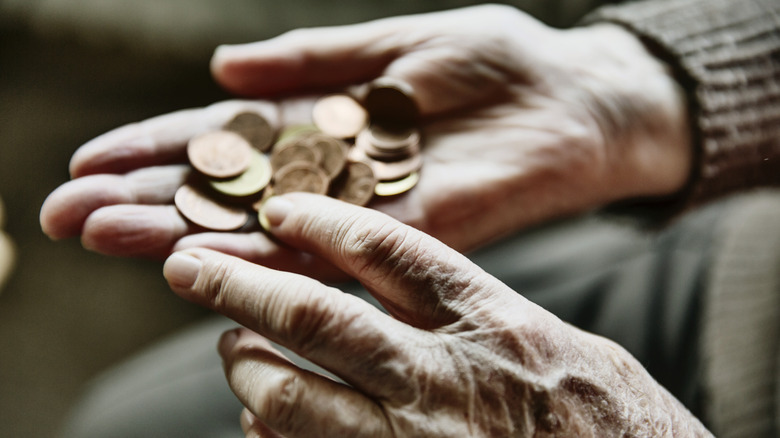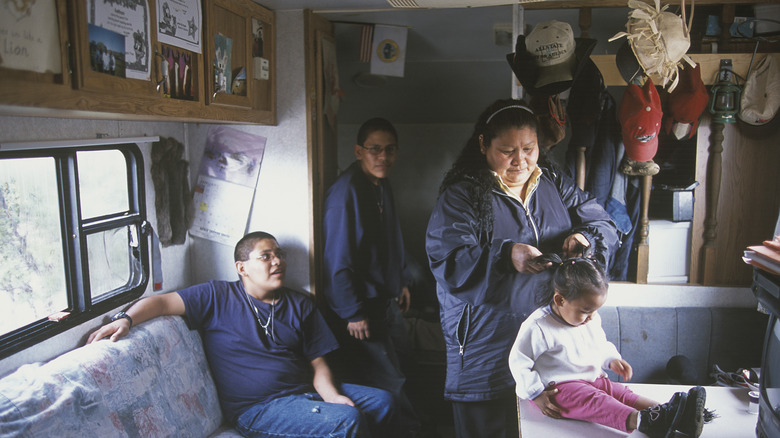If You Make Less Than This Income, You're Officially Lower Class
The term "lower class" is often linked to being near the bottom of the economic ladder, and while income is a factor, it's not the whole picture. Government and financial institutions set specific income limits to define income levels and poverty. Perhaps one of the most well-known measures in the U.S. for defining lower incomes is the federal poverty level, or FPL. This guideline is not only updated every year to keep up with inflation and the cost of living, but is used to determine who qualifies for social assistance programs.
According to the U.S. Department of Health and Human Services, for 2025, the federal poverty guideline for a family of four is $31,150, and $15,650 for a single person — with Alaska and Hawaii having slightly different income guidelines (and a far cry from the amount that most Americans think they need to live comfortably). However, the federal poverty line isn't the only way to measure financial struggles. There are also ALICE workers — short for Asset Limited, Income Constrained, Employed — who earn too much to be below the poverty line but still struggle to pay for everyday needs. According to Investopedia, 54% of those considered ALICE workers reported having trouble affording food, housing, transportation, and healthcare in 2023. While many work full-time, rising costs keep them financially struggling. Many are one surprise expense — a car repair, a medical bill, or a job loss — away from being pushed into poverty.
Factors impacting class
The federal poverty line — or ALICE — don't exclusively define what is considered lower class. Education, a key path for better jobs, plays a part as well. However, for many people from low-income backgrounds, quality education can be difficult to attain. According to a 2023 report from Brookings, only about 51% of lower-income students enroll in college compared to 89% of students from higher-income families. While you do not need a college degree to work some high-paying jobs, without higher education, job options can be more limited. According to the American Psychological Association, poor education can keep the cycle of poverty going — often making it even harder for people to break free from financial struggles.
The job opportunities that do exist for lower class workers are often limited to low-wage industries like retail, food service, and manual labor. Lower income people can also face additional systemic barriers tied to their race, gender, and ethnicity. In fact, women and minorities tend to face higher levels of job segregation, which can further affect their earning potential and career growth — not to mention how the racial wealth gap impacts income. According to a 2023 report from the National Women's Law Center, women made up nearly two-thirds of all low-wage workers, keeping many stuck in lower-paying jobs with fewer opportunities to build financial security.
The reality of being lower class
People in the lower class often live paycheck to paycheck, with almost no savings to lean on. This leaves them especially vulnerable to unexpected expenses and economic downturns, while affecting their mental and social well-being. Moreover, the stigma surrounding poverty can lead to feelings of shame and social isolation. Lower-income individuals are also less likely to vote or engage in civic activities, which only further silences their voices. Even worse, studies like a 2015 report from the Academic Pediatric Association, have found that children from lower-income families often experience worse developmental outcomes, impacting their cognitive development and educational outcomes and further continuing the cycle.
Even those working to fight poverty, like nonprofit workers, frequently earn low salaries that barely keep them out of the ALICE category themselves. In 2024, the Independent Sector and United For ALICE released a report that found that 22% of the country's roughly 13.9 million nonprofit employees struggled to afford basic necessities despite being employed and working on the front lines to combat the very inequities affecting them.


